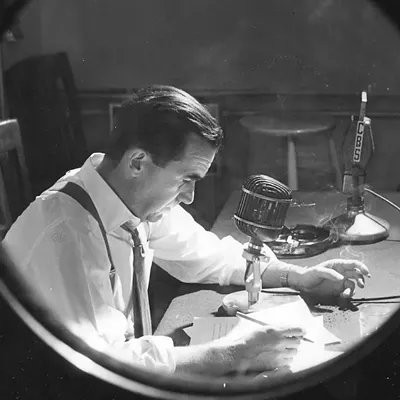"When you're holding me / we make a pair of parentheses / there's plenty space to encase whatever weird way my mind goes," coos Maricich on "Parentheses," recontextualizing age-old sentimentalism with precise syntactic jargon and youthful vagueness (a highly ironic pair). Fun, but not exactly novel. Fun's good enough, though, and the album's frenetic beat and tempo manipulation ("Pile of Gold" in particular) is great for thumb-drumming your steering wheel.
Given their record of championing the hookiest pop, it's not surprising that Apple made "Parentheses" their iTunes track of the week in early November, which set the buzz machines a-drone. Ten days later, Elle Girl magazine declared their love for the duo and printed an interview with Maricich on their web site, asking astute questions like "Do you play instruments?"
Though there's no excuse for that kind of interview, it's not hard to see why the Blow might be deemed harmless enough for Elle Girl. Dig only as deep as Paper Television's first track, though, and you'll find "Pile of Gold," a crackling treatise on sex as commodity. "All the girls are sitting on a pile of gold," sings Maricich, breathily. "All the girls, you know the boys they want it. They want it. Want it." There's a strange empowerment here, one Maricich neither endorses nor rejects. It's the promise of emotional equality -- not in her mind but between her legs. "Tell them, 'I know that you're brave enough / and you could learn to save enough / to make some trade with me.'" Sex is the thing she's willing to offer for emotional support. It's a shocking conclusion to draw from the last century of feminist struggle (and perhaps over-dependent on gender stereotype), but Maricich treats it with nonchalance. We've all got roughly the same brains, she reckons, so women can look to other, unique, bargaining chips.
Unsurprisingly, people are beginning to compare the Blow to shock rocker Peaches for the duo's attempt to level the interrelational playing field. Others, though -- who argue that the Blow does so without vulgarity, gender-bending or sexual callousness -- have declared them Peaches' antithesis. The fact that this debate even exists says something about the perceived importance of Paper Television.
That there's an entire generation of tittering 15-year-olds listening to the record via Elle Girl, blithely unaware of such academic patter, says something about what a catchy, vibrant, of-the-moment pop record Maricich and Bechtolt have constructed.
If ideas need a receptive environment and repetition to take root, it might not be Peaches -- appealing to angry, liberated college kids -- who changes the sexual landscape in this country. It may be the Blow, entering catchily through tweens' earbuds, softly empowering one Tiger Beat reader at a time.
The Blow with YACHT at Whitworth's HUB on Thursday, Feb. 8, at 9 pm. $5; free, Whitworth students. Call 777-1000.














